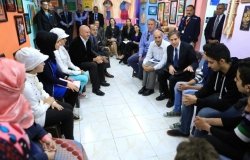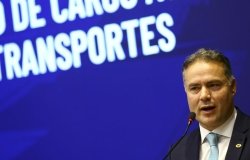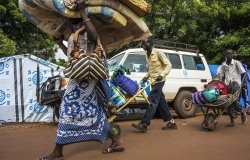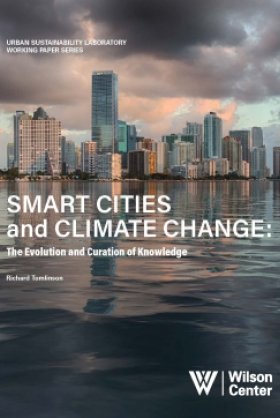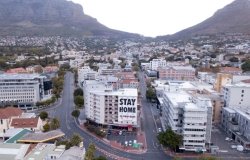World Urban Forum 4 & 5. From Nanjing to Rio de Janeiro: Bringing the Urban Agenda to the Development Community
Gerald C. Anderson, Deputy Assistant Secretary, Bureau of International Organizations Affairs, State Department; Judith A. Hermanson, Senior Vice President, CHF International; Jessica R. Tulodo, Acting Team Leader, Urban Programs and Engineering Services, USAID; Christopher W. Williams, Representative, UN-HABITAT, Washington DC Office
Overview
In November 2008, close to 8,000 people attended the Fourth Session of the World Urban Forum (WUF) in Nanjing China to discuss the twin challenges of urbanization and globalization that are facing more than half of the world's population who now live in cities. On Wednesday, January 7, the Comparative Urban Studies Project hosted a discussion, "World Urban Forum 4 & 5. From Nanjing to Rio de Janeiro: Bringing the Urban Agenda to the Development Community." The seminar brought together a group of nonprofit, government and UN representatives who participated in WUF4. Panelists shared the latest research and trends in urban development, focusing on policies and programs that promote socially, economically, environmentally, spatially, and historically harmonious cities. The panel of urban experts also reflected upon UN Habitat plans for the 5th World Urban Forum, which will take place in Buenos Aires in 2010.

 Gerald C. Anderson, Deputy Assistant Secretary of the Bureau of International Organizations Affairs for the State Department, highlighted the need for events like the WUF to stimulate creative thinking and new partnerships. The eight thousand WUF4 participants represented federal, state and local governments, NGOs, the private sector, and academic and research institutions. Anderson was encouraged by the large number of young people involved, and commended the many opportunities for youth leaders to participate in the forum. He encouraged building upon the connections made during the forum, and suggested the creation of a database of participants.
Gerald C. Anderson, Deputy Assistant Secretary of the Bureau of International Organizations Affairs for the State Department, highlighted the need for events like the WUF to stimulate creative thinking and new partnerships. The eight thousand WUF4 participants represented federal, state and local governments, NGOs, the private sector, and academic and research institutions. Anderson was encouraged by the large number of young people involved, and commended the many opportunities for youth leaders to participate in the forum. He encouraged building upon the connections made during the forum, and suggested the creation of a database of participants.
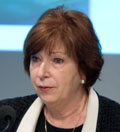 Judith A. Hermanson, Senior Vice President of CHF International, stressed the importance of the WUF as a platform for new ideas, promising practices and the opportunity for organizations and groups in the field to network.Forum participants exchanged strategies for facing new urban challenges such as population mobility, instant communication, growing youth populations, climate change, security, and transborder issues of health, trafficking and organized crime. The WUF was a success, said Hermanson, but the challenge remains to translate theory into widespread practice, incorporating complex urban issues into the broader development agenda.
Judith A. Hermanson, Senior Vice President of CHF International, stressed the importance of the WUF as a platform for new ideas, promising practices and the opportunity for organizations and groups in the field to network.Forum participants exchanged strategies for facing new urban challenges such as population mobility, instant communication, growing youth populations, climate change, security, and transborder issues of health, trafficking and organized crime. The WUF was a success, said Hermanson, but the challenge remains to translate theory into widespread practice, incorporating complex urban issues into the broader development agenda.
CHF hosted a session at the WUF4 to highlight lessons learned from over ten years of urban development work in the slums of Brazil, Morocco, Senegal and India. CHF case studies found: 1)effective community engagement and local planning are is critical to success;. 2)job creation and social infrastructure are often more important than physical development; 3) the private sector plays an important role in urban development; 4)economic integration and inclusive development is important to success; and, 5) the positive effects of urban intervention continue across time. Looking toWUF 5, the development community must demonstrate the importance of urban investment.
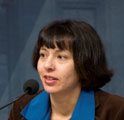 Jessica R. Tulodo, Acting Team Leader of Urban Programs and Engineering Services USAID, stated that the urban development community must expand its audience and deliver a compelling message that captures the imagination of policymakers. Tulodo pointed out that while NGOs were well represented at the WUF4, US mayors and state officials did not participate. We must tap into this community to build a broader network of those interested in cities in order to elevate the discussion of urban issues in Washington.Looking beyond WUF 4, Tulodo identified urban policy priorities for USAID: city management and service development; local economic development; the youth bulge and its related issues; facilitating community involvement; getting regulatory frameworks in place; and global climate change.
Jessica R. Tulodo, Acting Team Leader of Urban Programs and Engineering Services USAID, stated that the urban development community must expand its audience and deliver a compelling message that captures the imagination of policymakers. Tulodo pointed out that while NGOs were well represented at the WUF4, US mayors and state officials did not participate. We must tap into this community to build a broader network of those interested in cities in order to elevate the discussion of urban issues in Washington.Looking beyond WUF 4, Tulodo identified urban policy priorities for USAID: city management and service development; local economic development; the youth bulge and its related issues; facilitating community involvement; getting regulatory frameworks in place; and global climate change.
 Christopher W. Williams, Representative for UN-HABITAT, discussed the history and dynamic nature of the WUF. WUF continues to change as participants learn how to maximize their benefits and use the forum strategically.. By providing the space for diverse groups to interact and integrate their goals, the WUF has become a solid vehicle for consolidation. Reflecting on the future direction, Williams argued that participants need to leverage the WUF to advance the urban agenda. In order to continue WUF's success, a domestic constituency needs to be built in the US. Cities, mayors, financial and development communities in the US are an under-tapped resource that must be engaged. Williams believes that the new White House Office of Urban Policy, the HUD Secretary, and an informed Congress offer important opportunities to bring attention to urban issues. World Habitat Day, celebrated in October, and a series of events leading to the 2010 WUF5 in Rio will provide further occasion to widen the network of commitment to the urban agenda.
Christopher W. Williams, Representative for UN-HABITAT, discussed the history and dynamic nature of the WUF. WUF continues to change as participants learn how to maximize their benefits and use the forum strategically.. By providing the space for diverse groups to interact and integrate their goals, the WUF has become a solid vehicle for consolidation. Reflecting on the future direction, Williams argued that participants need to leverage the WUF to advance the urban agenda. In order to continue WUF's success, a domestic constituency needs to be built in the US. Cities, mayors, financial and development communities in the US are an under-tapped resource that must be engaged. Williams believes that the new White House Office of Urban Policy, the HUD Secretary, and an informed Congress offer important opportunities to bring attention to urban issues. World Habitat Day, celebrated in October, and a series of events leading to the 2010 WUF5 in Rio will provide further occasion to widen the network of commitment to the urban agenda.
Documents & Downloads
- World Urban Forum 4 & 5. From Nanjing to Rio de Janeiro: Bringing the Urban Agenda to the Development CommunityDownload
- World Urban Forum 4 & 5. From Nanjing to Rio de Janeiro: Bringing the Urban Agenda to the Development CommunityDownload
- World Urban Forum 4 & 5. From Nanjing to Rio de Janeiro: Bringing the Urban Agenda to the Development CommunityDownload
- World Urban Forum 4 & 5. From Nanjing to Rio de Janeiro: Bringing the Urban Agenda to the Development CommunityDownload
- World Urban Forum 4 & 5. From Nanjing to Rio de Janeiro: Bringing the Urban Agenda to the Development CommunityDownload
Hosted By

Urban Sustainability Laboratory
Since 1991, the Urban Sustainability Laboratory has advanced solutions to urban challenges—such as poverty, exclusion, insecurity, and environmental degradation—by promoting evidence-based research to support sustainable, equitable and peaceful cities. Read more
Thank you for your interest in this event. Please send any feedback or questions to our Events staff.
